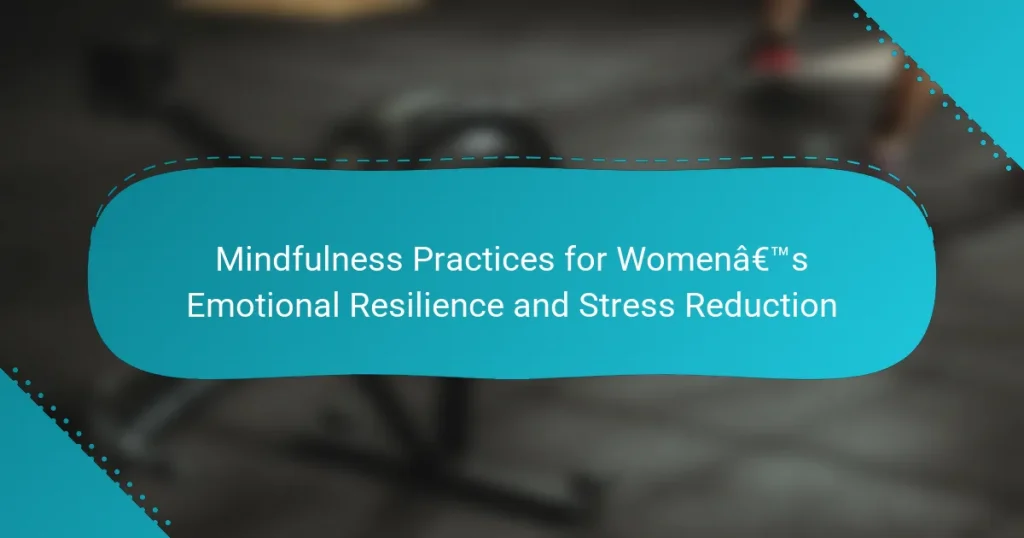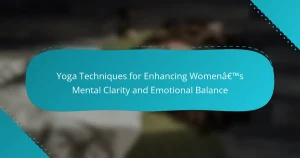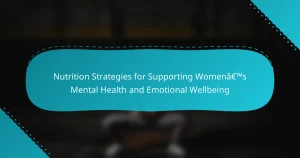Mindfulness practices can significantly enhance emotional resilience and reduce stress for women. Techniques such as mindful meditation, deep breathing exercises, and journaling promote self-awareness and emotional clarity. Engaging with nature and practicing gratitude further support well-being. These methods uniquely address women’s experiences and challenges, fostering deeper connections and understanding.
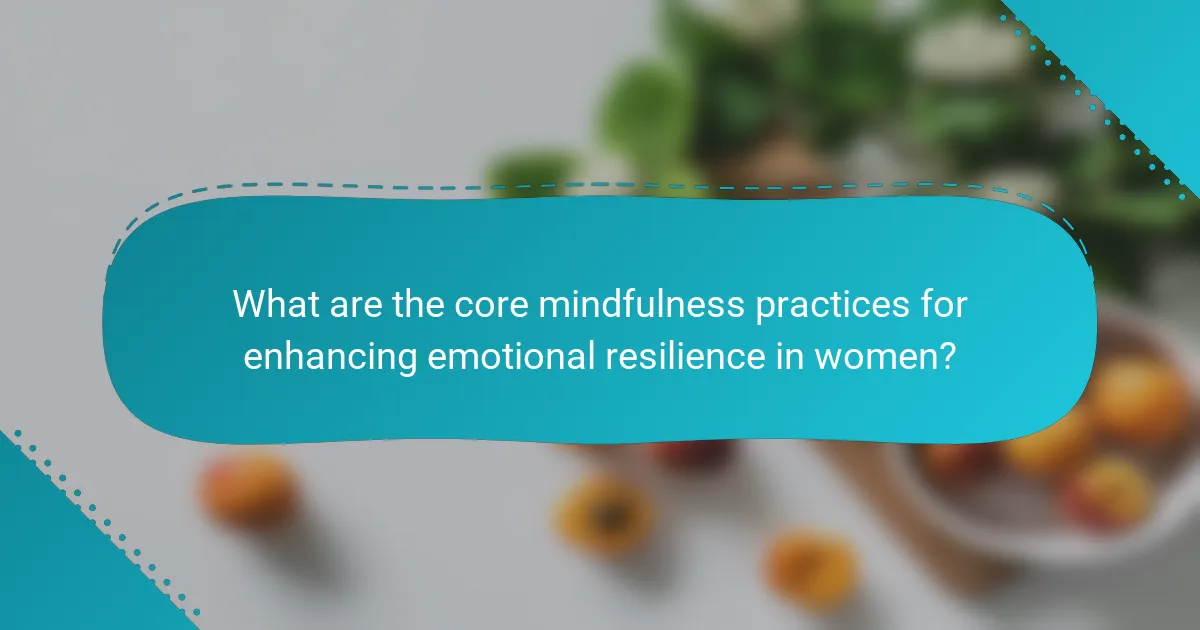
What are the core mindfulness practices for enhancing emotional resilience in women?
Mindfulness practices enhance emotional resilience in women through techniques like meditation, deep breathing, and body scans. These practices help reduce stress and improve emotional regulation.
1. Mindful Meditation: Regular sessions cultivate awareness and acceptance, fostering emotional stability.
2. Deep Breathing Exercises: Techniques such as diaphragmatic breathing lower anxiety and promote calmness.
3. Body Scan: This practice increases body awareness, helping to identify and release tension.
4. Journaling: Reflective writing encourages emotional expression and clarity, enhancing resilience.
5. Gratitude Practices: Focusing on positive aspects of life boosts mood and emotional strength.
6. Nature Walks: Engaging with nature reduces stress and enhances overall well-being.
Incorporating these core practices can significantly improve emotional resilience in women.
How does mindfulness support emotional regulation?
Mindfulness enhances emotional regulation by fostering awareness and acceptance of feelings. It encourages women to observe their emotions without judgment, reducing stress and promoting resilience. Research indicates that regular mindfulness practice can lead to lower anxiety levels and improved emotional stability. Mindfulness techniques, such as meditation and deep breathing, provide tools for managing overwhelming emotions effectively.
What role does self-compassion play in stress reduction?
Self-compassion significantly reduces stress by fostering a supportive inner dialogue. It encourages individuals to treat themselves with kindness during difficult times, which can lower anxiety and enhance emotional resilience. Research indicates that self-compassionate individuals experience less psychological distress, leading to improved coping strategies. This practice allows for a more balanced perspective, reducing negative self-criticism and promoting overall well-being.
What techniques can enhance self-compassion?
Practicing mindfulness techniques can significantly enhance self-compassion. Techniques such as mindful breathing, body scans, and loving-kindness meditation cultivate awareness and acceptance of one’s feelings. These practices foster emotional resilience by promoting a non-judgmental attitude towards oneself, which is crucial for stress reduction. Engaging in daily mindfulness routines can lead to improved emotional well-being and a deeper connection to personal experiences.
How can mindfulness improve overall mental health?
Mindfulness significantly enhances overall mental health by reducing stress and promoting emotional resilience. Regular mindfulness practices, such as meditation and deep breathing, help women manage anxiety and improve mood stability. Research shows that mindfulness can lower cortisol levels, leading to decreased stress responses. Furthermore, maintaining a consistent mindfulness routine fosters self-awareness, enabling women to better navigate emotional challenges. Mindfulness not only cultivates a sense of calm but also strengthens coping mechanisms, making it a vital tool for enhancing mental well-being.
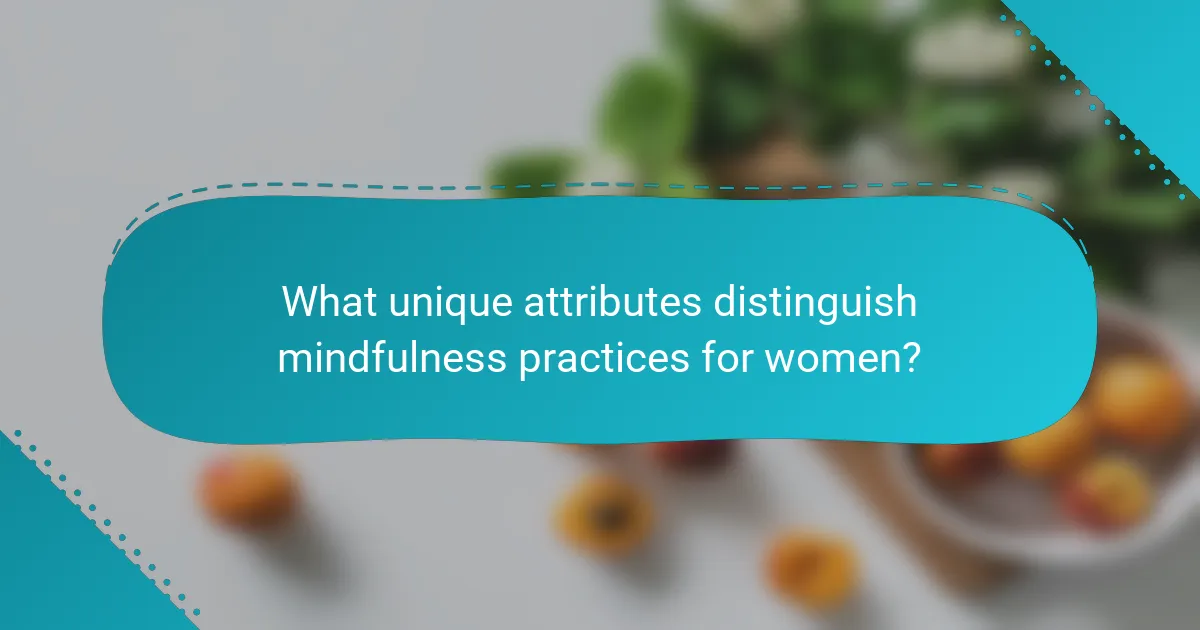
What unique attributes distinguish mindfulness practices for women?
Mindfulness practices for women uniquely emphasize emotional resilience and stress reduction through community support, gender-specific techniques, and hormonal awareness. These practices often incorporate nurturing elements that resonate with women’s experiences, fostering deeper connections and understanding. For example, group meditation sessions can enhance feelings of belonging, while mindfulness exercises tailored to menstrual cycles can optimize emotional well-being. Integrating these unique attributes helps women navigate stress and build resilience more effectively.
How do societal pressures impact women’s emotional health?
Societal pressures significantly affect women’s emotional health by contributing to stress and anxiety. Mindfulness practices enhance emotional resilience and reduce stress, helping women combat these pressures. Techniques such as meditation and deep breathing promote self-awareness and emotional regulation. Research shows that women who engage in mindfulness report lower levels of stress and improved emotional well-being. Regular practice fosters a unique attribute of resilience, enabling women to navigate societal expectations more effectively.
What specific mindfulness techniques are tailored for women’s experiences?
Mindfulness techniques tailored for women’s experiences include practices that address unique emotional and psychological needs. Techniques such as body scan meditation, which enhances body awareness, and loving-kindness meditation, which fosters self-compassion, are particularly effective. Journaling can also serve as a powerful tool for emotional processing and reflection. Additionally, group mindfulness sessions create community support, enhancing emotional resilience. These practices collectively empower women to manage stress and cultivate inner peace.
How can journaling be integrated into mindfulness practices?
Journaling can enhance mindfulness practices by promoting self-reflection and emotional clarity. Integrating journaling involves setting aside dedicated time for writing, focusing on feelings and thoughts, and using prompts to guide exploration. This practice fosters emotional resilience by enabling women to process stress and develop coping strategies. Regularly engaging in journaling can lead to improved mental well-being and a deeper connection to mindfulness.
What are the benefits of group mindfulness sessions for women?
Group mindfulness sessions enhance women’s emotional resilience and reduce stress by fostering a supportive community. These sessions promote shared experiences, which can lead to increased empathy and understanding among participants.
Research shows that group mindfulness practices can significantly lower anxiety levels, improve mood, and enhance overall well-being. Women often report feeling more connected and supported, which is crucial for mental health.
Additionally, the unique attribute of group dynamics can amplify the benefits of mindfulness, as participants learn from each other’s perspectives and coping strategies. This collective approach can lead to lasting changes in emotional regulation and stress management.
Overall, engaging in group mindfulness sessions provides women with valuable tools for navigating life’s challenges while building a strong support network.
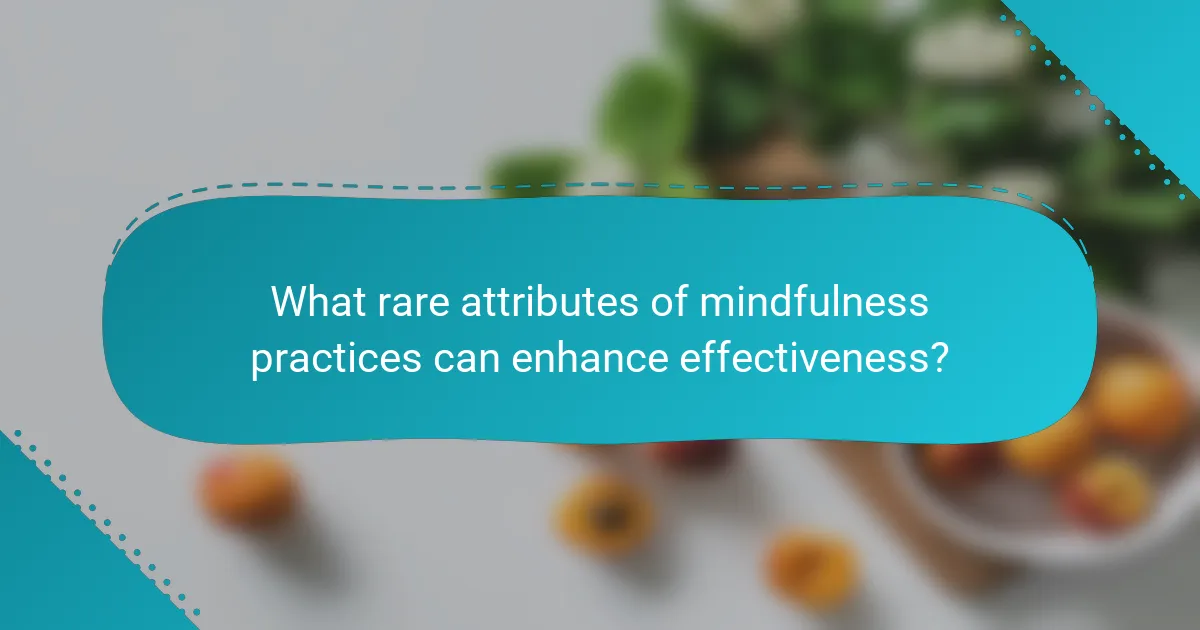
What rare attributes of mindfulness practices can enhance effectiveness?
Rare attributes of mindfulness practices that can enhance effectiveness include personalized techniques, integration with other therapeutic modalities, and cultural adaptations. Personalized techniques cater to individual emotional responses, improving engagement and outcomes. Integration with therapies like cognitive behavioural therapy can deepen understanding and application. Cultural adaptations ensure practices resonate with diverse backgrounds, enhancing relatability and effectiveness. These unique elements contribute significantly to women’s emotional resilience and stress reduction.
What uncommon mindfulness techniques are particularly beneficial for women?
Uncommon mindfulness techniques beneficial for women include forest bathing, sound meditation, and expressive arts therapy. Forest bathing, or Shinrin-yoku, enhances emotional resilience by immersing individuals in nature, promoting relaxation and reducing stress. Sound meditation uses vibrational frequencies from instruments like singing bowls to foster deep relaxation and emotional release. Expressive arts therapy encourages women to explore emotions through creative outlets, enhancing self-awareness and coping strategies. These techniques offer unique pathways for women to cultivate mindfulness, improving overall emotional well-being.
How can cultural perspectives influence mindfulness practices?
Cultural perspectives significantly shape mindfulness practices, affecting their interpretation and application. Different cultures emphasize unique attributes, such as community connection or individual reflection, influencing emotional resilience and stress reduction. For instance, Eastern traditions often integrate mindfulness with spirituality, while Western approaches may focus on psychological techniques. This diversity enriches the practice, allowing women to adapt mindfulness to their cultural contexts, enhancing its effectiveness in managing stress. Understanding these cultural nuances fosters a more inclusive and personalized approach to mindfulness, promoting emotional well-being.
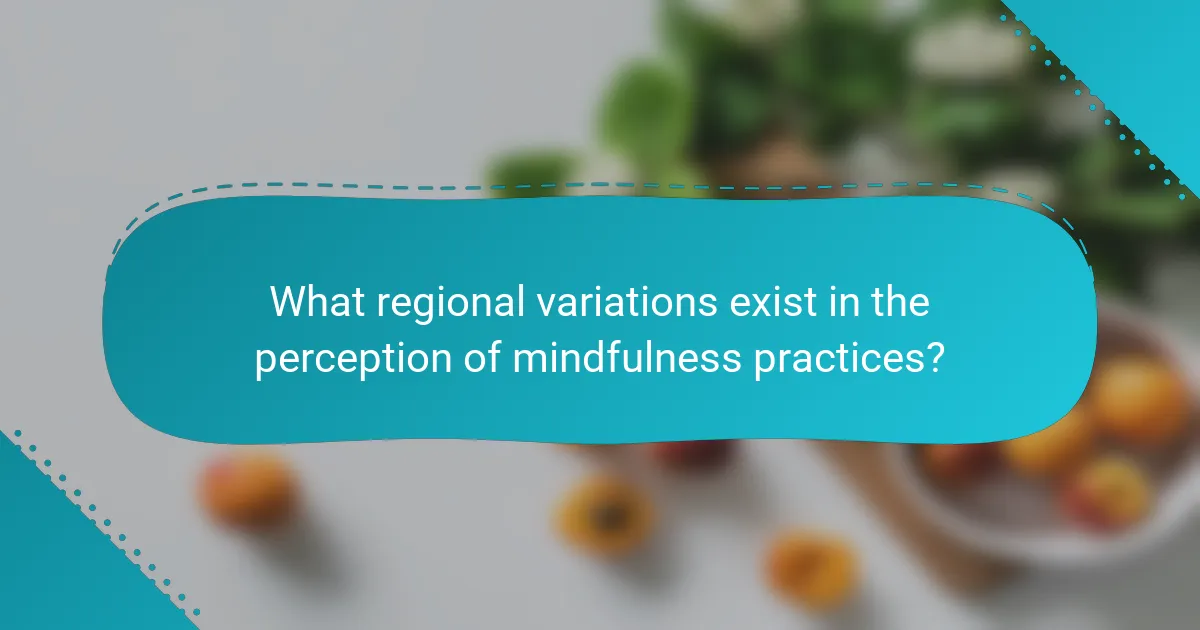
What regional variations exist in the perception of mindfulness practices?
Perceptions of mindfulness practices vary significantly across regions, influenced by cultural, social, and historical factors. In Western countries, mindfulness is often viewed as a therapeutic tool for stress reduction and emotional resilience. Conversely, in Eastern cultures, it is deeply rooted in spiritual traditions and holistic well-being.
In North America, mindfulness practices emphasize personal development and mental health benefits. Studies show that 80% of participants report reduced stress after engaging in mindfulness activities. In contrast, in countries like Japan, mindfulness is integrated into daily life, promoting community harmony and collective well-being.
Furthermore, unique attributes such as the incorporation of local traditions into mindfulness practices can be observed. For instance, African mindfulness often includes communal gatherings and storytelling, enhancing emotional resilience through collective experiences. These regional variations highlight the adaptability of mindfulness practices to meet diverse cultural needs.
How do cultural backgrounds shape mindfulness approaches for women?
Cultural backgrounds significantly influence mindfulness approaches for women by shaping their perceptions and practices. Different cultures prioritize various aspects of mindfulness, such as community involvement, spirituality, or individualism. For instance, Eastern traditions often emphasize collective well-being, while Western practices may focus on personal achievement. This cultural context affects the techniques women adopt, from meditation styles to the integration of mindfulness in daily life. Moreover, unique cultural narratives can enhance emotional resilience, providing women with tailored coping mechanisms that resonate with their experiences. Understanding these cultural nuances allows for more effective mindfulness strategies that cater to diverse women’s needs.
What local resources support women’s mindfulness practices?
Local resources supporting women’s mindfulness practices include community centres, yoga studios, and wellness workshops. These venues often offer classes specifically designed for women focused on emotional resilience and stress reduction. For example, local women’s groups may host meditation sessions or mindfulness retreats. Additionally, therapists specializing in mindfulness techniques can provide personalized support. Local libraries often feature books and resources on mindfulness practices tailored for women’s needs. Engaging with these resources fosters a supportive environment for enhancing mental well-being.
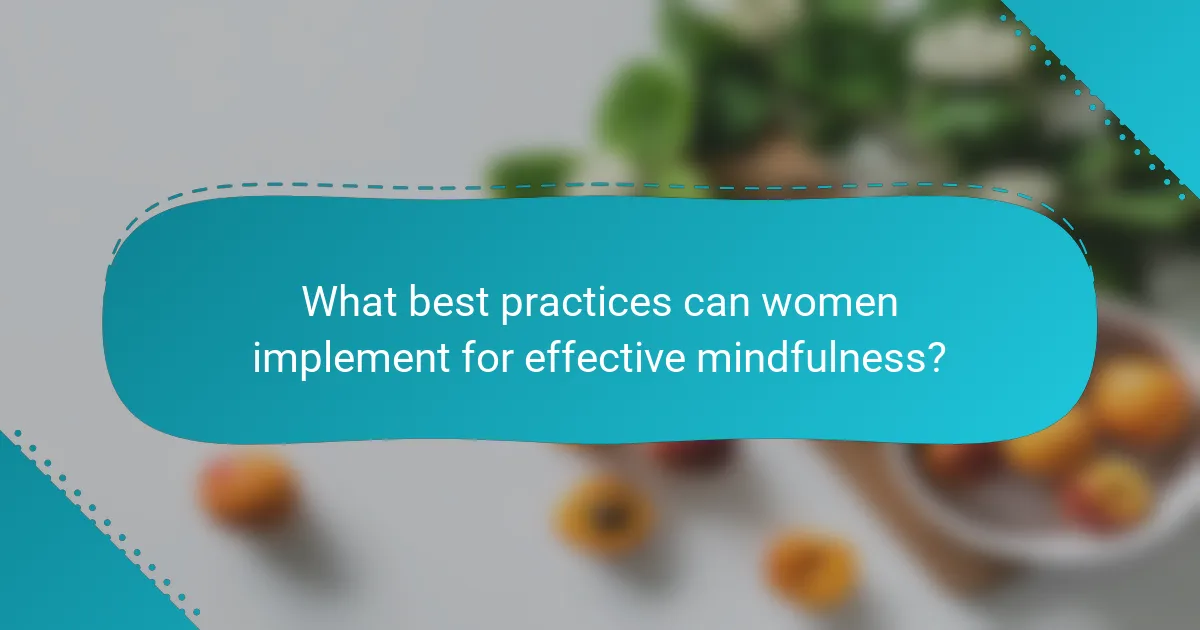
What best practices can women implement for effective mindfulness?
Women can implement mindfulness practices such as meditation, journaling, and deep breathing for emotional resilience and stress reduction. These techniques enhance self-awareness and promote relaxation. Regular meditation has been shown to reduce anxiety levels by 39%. Journaling allows for emotional expression, fostering clarity. Deep breathing exercises can lower heart rate and improve overall well-being.
What common mistakes should women avoid in mindfulness practices?
Women should avoid common mistakes in mindfulness practices to enhance emotional resilience and reduce stress. Key pitfalls include neglecting consistency, focusing too much on perfection, and disregarding personal needs.
1. Inconsistency: Practicing mindfulness sporadically diminishes its benefits. Regular engagement is essential for emotional resilience.
2. Perfectionism: Striving for an ideal mindfulness experience can lead to frustration. Embrace the process instead of an unattainable standard.
3. Ignoring individual preferences: Mindfulness practices should align with personal values and lifestyles. Customization enhances effectiveness and sustainability.
4. Overthinking: Analyzing every thought during mindfulness can hinder relaxation. Allow thoughts to flow without judgment.
5. Skipping self-compassion: Being harsh on oneself can counteract the benefits of mindfulness. Cultivating self-kindness is vital for emotional well-being.
How can women optimize their mindfulness routines for stress reduction?
Women can optimize mindfulness routines for stress reduction by incorporating regular practices that enhance emotional resilience. Techniques such as deep breathing, meditation, and journaling create a structured approach to managing stress.
Establishing a consistent schedule for mindfulness activities can significantly improve their effectiveness. Research shows that dedicating just 10 minutes daily to mindfulness can lead to measurable reductions in stress levels.
Engaging in mindful movement, such as yoga or tai chi, combines physical activity with mindfulness, providing unique benefits for emotional health. These practices promote relaxation and enhance body awareness, which is essential for managing stress.
Finally, connecting with supportive communities can enhance mindfulness practices. Sharing experiences and insights with others fosters a sense of belonging and can amplify the stress-reducing effects of mindfulness.
What expert insights can enhance mindfulness effectiveness for women?
Incorporating expert insights can significantly enhance the effectiveness of mindfulness practices for women. Techniques such as guided imagery and body scans help deepen emotional resilience and stress reduction. Research indicates that these methods can improve emotional regulation and decrease anxiety levels. Additionally, integrating mindfulness into daily routines fosters consistency, making it easier to cultivate long-term benefits. Engaging with supportive communities also amplifies the positive effects of mindfulness, providing encouragement and shared experiences.
